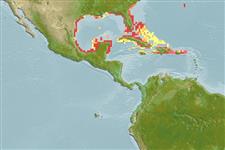Common names from other countries
分類 / Names
共通名の | 類義語 | Catalog of Fishes(部類, 種) | ITIS | CoL | WoRMS | Cloffa
Environment: milieu / climate zone / depth range / distribution range
生態学
海 底生の; 移住性ではない; 深さの範囲 0 - 10 m (Ref. 52034). Subtropical; 33°N - 17°N, 99°W - 64°W
Western Atlantic: Bermuda, southern Florida (USA), Bahamas and the entire Gulf of Mexico.
Length at first maturity / サイズ / 重さ / 年齢
Maturity: Lm 2.1 range ? - ? cm
Max length : 5.0 cm TL オス/雌雄の選別がない; (Ref. 7251); 最大記録サイズ: 1.00 年 (Ref. 12238)
簡単な記述
検索表 | 形態学 | 形態計測学
背面の脊椎 (合計) : 0; 背鰭 (合計) : 12.
Shallow grass flats, especially in association with Zostera and other seagrass; periodically found in floating vegetation. Diurnal, males more site faithful than females. Ovoviviparous (Ref. 205). The male carries the eggs in a brood pouch which is found under the tail (Ref. 205). Specimens lose their skin filaments in aquaria (Ref. 30915). Has been reared in captivity (Ref. 35420). Maximum depth reported taken from Ref. 128812.
Monogamous mating is observed as both obligate and genetic (Ref. 52884). Male carries the eggs in a brood pouch (Ref. 205). Female transfers all the eggs in the ovary to the brood pouch of the male (Ref. 1284).
Lourie, S.A., R.A. Pollom and S.J. Foster, 2016. A global revision of the seahorses Hippocampus Rafinesque 1810 (Actinopterygii: Syngnathiformes): taxonomy and biogeography with recommendations for further research. Zootaxa 4146(1):1-66. (Ref. 115213)
Human uses
水産業: 少数商業の
用具
特記事項
XMLをダウンロードして下さい
インターネットの情報源
Estimates based on models
Preferred temperature (Ref.
115969): 23.4 - 27.8, mean 26.6 (based on 229 cells).
Phylogenetic diversity index (Ref.
82804): PD
50 = 0.5000 [Uniqueness, from 0.5 = low to 2.0 = high].
Bayesian length-weight: a=0.00447 (0.00177 - 0.01127), b=3.00 (2.78 - 3.22), in cm Total Length, based on LWR estimates for this (Sub)family-body shape (Ref.
93245).
栄養段階 (Ref.
69278): 3.2 ±0.5 se; based on size and trophs of closest relatives
回復力 (Ref.
120179): 手段, 1.4年~4.4年の倍増期間の最小個体群 (tm=0.4; tmax=1; assuming Fec=100 (approx. 3 generations/year)).
Fishing Vulnerability (Ref.
59153): Low vulnerability (10 of 100).
